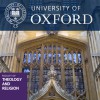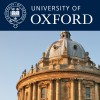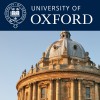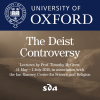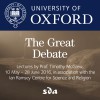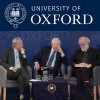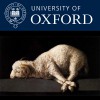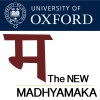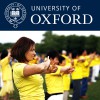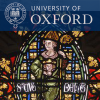Faculty of Theology and Religion

Relevant Links
Oxford's Theology Faculty is the largest in the country and it is home to many scholars of international distinction. In the past year, as often before, it has topped the rankings in both the Times and Guardian university guides. While maintaining and developing its long-term strengths in biblical studies, church history and Christian doctrine, the Faculty has in recent years broadened its range to embrace the Study of Religion and work in the major religious traditions of the world, studied in the light of the human sciences.
There are some 340 students on different undergraduate courses and about 190 graduates undertaking both taught and research degrees. The core team of University Professors and Lecturers is 23-strong, and this is complemented by a wide-ranging Faculty membership of high quality. These include College lecturers, junior research fellows, and staff members at the Permanent Private Halls.
Series associated with Faculty of Theology and Religion
| # | Episode Title | Description | People | Date | |
|---|---|---|---|---|---|
| 62 | Theologians and their audience: persuasion or advocacy? | Fourth and final video of the 2019 Hensley Henson series, with Prof Morwenna Ludlow, The University of Exeter. | Morwenna Ludlow | 07 Mar 2019 | |
| 61 | Making and being made: the craft of words as discipleship | Third lecture in the 2019 Hensley Henson series, with Prof Morwenna Ludlow, The University of Exeter. | Morwenna Ludlow | 21 Feb 2019 | |
| 60 | The theologian as wordsmith: a 'good man expert in speaking'? | Second lecture in the 2019 Hensley Henson series, with Prof Morwenna Ludlow, The University of Exeter. | Morwenna Ludlow | 08 Feb 2019 | |
| 59 | Good words: for profit or for pleasure? | First lecture in the 2019 Hensley Henson lecture series. With Prof Morwenna Ludlow, The University of Exeter. | Morwenna Ludlow | 24 Jan 2019 | |
| 58 | The Religion of Thomas Cromwell (part 2) | Professor Diarmaid MacCulloch, Professor of the History of the Church, gives the fourth and final lecture in the Hensley Henson 2018 series. | Diarmaid MacCulloch | 12 Jun 2018 | |
| 57 | Cromwell and the Monasteries (part 2) | Professor Diarmaid MacCulloch, Professor of the History of the Church, gives the third lecture in the Hensley Henson 2018 series. | Professor of the History of the Church | 12 Jun 2018 | |
| 56 | Cromwell and the Monasteries (part 1) | Professor Diarmaid MacCulloch, Professor of the History of the Church, gives the second lecture in the Hensley Henson 2018 series. | Diarmaid MacCulloch | 12 Jun 2018 | |
| 55 | The Religion of Thomas Cromwell (part 1) | Professor Diarmaid MacCulloch, Professor of the History of the Church, gives the first lecture in the Hensley Henson 2018 series. | Diarmaid MacCulloch | 12 Jun 2018 | |
| 54 | Lecture 05: Populist Skepticism: Paine and Watson | This lecture begins the account of the sceptics who appealed to the common working man, with the main focus of this first lecture on Thomas Paine, with responses by Bishop Richard Watson. | Timothy McGrew | 29 Jun 2017 | |
| 53 | Lecture 04: Urbane Skepticism: Mill and Arnold | This second and final lecture on urbane scepticism deals with the work of the Utilitarian John Stuart Mill and the English poet Matthew Arnold. | Timothy McGrew | 29 Jun 2017 | |
| 52 | Lecture 03: Urbane Skepticism: Gibbon vs. Watson | Urbane scepticism, an extension of English Deism, is presented in this lecture mostly through the lens of Edward Gibbon’s Decline and Fall of the Roman Empire, with a response by Bishop Richard Watson. | Timothy McGrew | 29 Jun 2017 | |
| 51 | Lecture 02: Continental Skepticism | The focus of this lecture is continental scepticism, primarily a French movement influenced by Deism, and its main proponents: Voltaire and Rousseau. | Timothy McGrew | 29 Jun 2017 | |
| 50 | Lecture 01: Introduction and Course Overview | This lecture introduces the course and the seven sceptical challenges of the period: continental, urbane, populist, scholarly, transcendental, establishment, and Dutch and German. | Timothy McGrew | 29 Jun 2017 | |
| 49 | Lecture 18: Hume’s “Of Miracles,” Part 2 | The final lecture gives an overview of the second part of Hume’s argument in ‘Of Miracles’, with responses from William Adams, George Campbell, Peter Bayne, and John Douglas. | Timothy McGrew | 22 Jun 2017 | |
| 48 | Lecture 17: Hume’s “Of Miracles,” Part 1 | The second in this series on Hume explicates the details of his argument and gives an explanation of the argument in part one, as well as responses from Hume’s contemporary, William Adam, and the Mathematician Charles Babbage. | Timothy McGrew | 22 Jun 2017 | |
| 47 | Lecture 16: David Hume: Introduction to “Of Miracles” | Here begins the discussion of David Hume, especially his essay ‘Of Miracles’ from his Philosophical Essays. This lecture includes differing interpretations for the argument Hume is making in part one of his essay. | Timothy McGrew | 22 Jun 2017 | |
| 46 | Lecture 15: Dodwell and his Critics | This lecture wraps up the discussion of Dodwell, containing more of his thoughts, and reactions to them from Philip Doddridge and John Leland, with additional comments on the connection between Dodwell and David Hume. | Timothy McGrew | 22 Jun 2017 | |
| 45 | Lecture 14: Annet and Dodwell | This lecture continues Annet’s response to the Tryal of the Witnesses and a rebuttal of him by Charles Moss. Another subject covered is the work of Henry Dodwell Jr and his arguments against using reason as a basis for Christianity. | Timothy McGrew | 22 Jun 2017 | |
| 44 | Lecture 13: Thomas Chubb and Peter Annet | This lecture details the ideas of two popular Deists, Thomas Chubb and Peter Annet, as well as responses by Caleb Fleming, Jonathan Edwards, and John Leland. | Timothy McGrew | 22 Jun 2017 | |
| 43 | Lecture 12: Butler’s Analogy of Religion | The Anglican Bishop Joseph Butler’s Analogy of Religion, an important and influential work in the Deist controversy, is the content of this lecture. | Timothy McGrew | 22 Jun 2017 | |
| 42 | Lecture 11: Tindal, Conybeare, and Foster | This lecture is primarily about the work of the Deist Matthew Tindal, and a possible influence of his in Fleetwood. Also included are his detractors, John Conybeare and James Foster. | Timothy McGrew | 22 Jun 2017 | |
| 41 | Lecture 10: Woolston and Sherlock on the Resurrection | The Tryal of the Witnesses of the Resurrection by Thomas Sherlock is the focus of this lecture. Sherlock’s work is a thorough refutation of Woolston’s Sixth Discourse. The Tryal is in the form of a mock trial and was very popular. | Timothy McGrew | 22 Jun 2017 | |
| 40 | Lecture 09: Collins and Woolston on Prophecy and Miracles | This lecture continues the discussion of Collins, but also adds the thoughts of Thomas Woolston and his Discourses on the Miracles of Our Saviour. Included also are responses from Chandler and Zachary Pierce. | Timothy McGrew | 22 Jun 2017 | |
| 39 | Lecture 08: Anthony Collins on Free-Thinking and Christianity | This lecture focuses on Anthony Collins, one of the major figures in the Deist movement, and includes responses by Bentley, Leland, and Chandler. The modern scholar Richard Hays is discussed as an extension of Chandler’s arguments. | Timothy McGrew | 22 Jun 2017 | |
| 38 | Lecture 07: Shaftesbury on Free-Thinking and Religion | This lecture is primarily about the thoughts of Anthony Ashley-Cooper, the Earl of Shaftsbury, with a connection to modern thoughts along the same lines. Also, Shaftesbury’s thoughts are here scrutinized by Brown. | Timothy McGrew | 22 Jun 2017 | |
| 37 | Lecture 06: Early Deism: Early Responses; Toland | This lecture continues the early response to Deism with Richard Baxter, including his view of the relationship between faith and reason, plus Locke, Halyburton, and Leslie. The thoughts of the Deist John Toland are also discussed. | Timothy McGrew | 22 Jun 2017 | |
| 36 | Lecture 05: Early Deism: Herbert, Spinoza, Blount | This lecture begins a detailed discussion of Deistic thought, starting with the early Deists, Herbert of Cherbury, later plagiarized in Charles Blount’s Reglio Laici, and Baruch Spinoza, with responses from Stillingfleet and Boyle. | Timothy McGrew | 22 Jun 2017 | |
| 35 | Lecture 04: Background: Philosophical and Religious Thought | In this lecture Dr McGrew gives a short history of philosophy and religion, especially the lesser known figures, which affected and influenced the thoughts of the authors involved in the Deist controversy. | Timothy McGrew | 22 Jun 2017 | |
| 34 | Lecture 03: Background: History of Science | This lecture is a quick summary of the history of science from Aristotle to Newton. Dr McGrew also includes a brief discussion of why the history of science is important to the Deist controversy. | Timothy McGrew | 22 Jun 2017 | |
| 33 | Lecture 02: Background: Civil History of England | This lecture is a brief introduction to the political and religious climate in England which set the backdrop to the Deist controversy. | Timothy McGrew | 22 Jun 2017 | |
| 32 | Lecture 01: Introduction: What was the Deist Controversy? | The first lecture gives a brief overview of the Deist controversy, what Deism is, and when the controversy was. This also includes an introduction to some of the major authors involved on both sides of the discussion. | Timothy McGrew | 22 Jun 2017 | |
| 31 | The Remedy: Introduction | In this short podcast, Naomi Richman introduces the series, 'The Remedy' by offering some history and context to contemporary discussions about health and healing. | Naomi Richman | 08 May 2017 | |
| 30 | The Remedy: Hinduism | In this episode, Naomi Richman interviews Matthew Martin, a DPhil student at of Oxford whose work focuses on Hindu traditions. They discuss the great variety of Hindu approaches to healing, from ayuverda to yoga and deliverance from evil spirits. | Naomi Richman, Matthew Martin | 08 May 2017 | |
| 29 | The Remedy: Humanism | In this episode, Naomi Richman interviews David Flint, Vice-Chair of the North London Humanists to find out what humanism can offer the sick. They discuss the role of modern medicine and the possibilities of living forever. | Naomi Richman, David Flint | 16 Nov 2016 | |
| 28 | The Remedy: Christianity | In this episode, Naomi Richman interviews Rev. Jody Stowell about Christian attitudes to health and understandings of healing. Starting by looking at Jesus' treatment of the sick, they move on to discussing the role of faith-healing in today's context. | Naomi Richman, Jody Stowell | 16 Nov 2016 | |
| 27 | A Dose of Wittgenstein | Mark Siderits (Seoul National University emeritus) gives the eleventh talk in the New Madhyamaka workshop. | Mark Siderits | 13 Aug 2015 | |
| 26 | Linguistic and Philosophical Integration of Madhyamaka: Some Reflections | Mattia Salvini (Mahidol University) gives the tenth talk in the New Madhyamaka workshop. | Mattia Salvini | 13 Aug 2015 | |
| 25 | Ninth talk in the New Madhyamaka workshop | Parimal Patil (Harvard University), gives the ninth talk in the New Madhyamaka workshop. | Parimal Patil | 13 Aug 2015 | |
| 24 | Quantum Mechanics and Deep Interconnectness | Michel Bitbol (Centre Nationale de la Recherce Scientifique, Paris), gives the eighth talk in the New Madhaymaka workshop. | Michel Bitbol | 13 Aug 2015 | |
| 23 | Perspectivalism and Madhyamaka | Charles Goodman, (Binghampton University), gives the sixth talk in the New Madhyamaka workshop. | Charles Goodman | 13 Aug 2015 | |
| 22 | The Fifth Corner of Four | Graham Priest, (Graduate Centre, City University of New York), gives the fourth talk in the New Madhyamaka workshop. | Graham Priest | 13 Aug 2015 | |
| 21 | Madhyamaka, Consciousness and Mental Causation | Sonam Thakchoe (University of Tasmania), gives the third talk in the New Madhymaka workshop | Sonam Thakchoe | 13 Aug 2015 | |
| 20 | Modern Philosophical Tools and Classic Madhyamaka Texts | Jay Garfield (Yale/National University of Singapore) gives the second talk in the New Madhyamaka workshop. | Jay Garfield | 13 Aug 2015 | |
| 19 | Introduction to the New Madhyamaka workshop | Jan Westerhoff, Associate Professor of Religious Ethics at the University of Oxford, introduces The New Madhyamaka workshop. | Jan Westerhoff | 13 Aug 2015 | |
| 18 | Creative Commons | 5. Sacrifice in the Vedic Religions | Professor Gavin Flood talks to Tim Howles about his chapter 'Sacrifice as Refusal' | Gavin Flood, Tim Howles | 27 Jan 2014 |
| 17 | Creative Commons | 4. Human Sacrifice in the Mesoamerican Cultures | Dr Laura Rival talks to Tim Howles about her chapter 'The Aztec Sacrificial Complex' | Laura Rival, Tim Howles | 27 Jan 2014 |
| 16 | Creative Commons | 3. Henri Hubert, Marcel Mauss and Sacrifice | Dr Nick Allen talks to Tim Howles about his chapter 'Using Hubert and Mauss to think about Sacrifice' | Nick Allen, Tim Howles | 27 Jan 2014 |
| 15 | Creative Commons | 2. Sacrifice, Self-Destructive Love and Feminism | Dr Pamela Sue Anderson talks to Tim Howles about her chapter 'Sacrifice as Self-Destructive Love: Why Autonomy should still matter to Feminists' | Pamela Sue Anderson, Tim Howles | 27 Jan 2014 |
| 14 | Creative Commons | 1. An Introduction to Sacrifice and Modern Thought | Dr Johannes Zachhuber talks to Tim Howles about his chapter 'Modern Discourse on Sacrifice and its Theological Background’ | Johannes Zachhuber, Tim Howles | 27 Jan 2014 |
| 13 | Creative Commons | What Makes a Belief Believable? Graham Ward Inaugural Lecture | Graham Ward is the Regius Professor Divinity, Christ Church, University of Oxford and a Canon of the Cathedral. Here, he gives his inaugural lecture as Regius Professor of Divinity on What makes a belief believable. | Graham Ward | 22 May 2013 |
| 12 | Creative Commons | Biblical Criticism and the Decline of America's Biblical Civilisation, 1865-1918: 2013 Astor Lecture | The Faculty of Theology and Religion will host Professor Mark Noll (University of Notre Dame) as the Astor Lecturer in Trinity Term 2013. | Mark Noll | 22 May 2013 |
| 11 | The nature of human beings and the question of their ultimate origin | The Archbishop of Canterbury, Prof. Richard Dawkins and Sir Anthony Kenny took part in a discussion titled "The nature of human beings and the question of their ultimate origin". Held at the Sheldonian Theatre, Oxford in Feb 2012. | Richard Dawkins, Rowan Williams, Anthony Kenny | 28 Feb 2012 | |
| 10 | Creative Commons | The Sacred Rites in Kant's Soul | Steve Clarke, James Martin Research Fellow, Institute for Science and Ethics, Oxford Martin School, Oxford gives a talk for the Ian Ramsey Centre for Science and Religion. | Steve Clarke | 22 Jul 2011 |
| 9 | Evolutionary Theology Without the Concept of Progress | Fraser Watts, Cambridghe, gives a talk for the Ian Ramsey Centre for Science and Religion Seminar series. | Fraser Watts | 22 Jul 2011 | |
| 8 | Thinking with Christians: Doing Ecclesiastical History in a secular age | Sarah Foot, Regius Professor of Ecclesiastical History, Christ Church, University of Oxford, gives the Inaugural Lecture on the 18th May 2011. | Sarah Foot | 31 May 2011 | |
| 7 | Creative Commons | Neuroscience and the Soul | Professor Roger Scruton gives a talk for the Ian Ramsey Centre for Science and Religion on the 21st October, 2010. | Roger Scruton | 16 May 2011 |
| 6 | Creative Commons | Science and Religion Around the World - Book Launch (27 Jan 2011) | Geoffrey Cantor, John Brooke, Ronald Numbers and Keith Benson, contributors to the Science and Religion Around the World book, give presentations for the Ian Ramsay Seminar Series on 27th January 2011 as part of the book launch. | Geoffrey Cantor, John Brooke, Ronald Numbers, Keith Benson | 18 Apr 2011 |
| 5 | Creative Commons | On the very idea of criteria for personhood (4 Nov 2010) | Timothy Chappell, Professor of Philosophy, Open University, gives a talk for the Ian Ramsay Seminar series on 4th November, 2010. | Timothy Chappell | 18 Apr 2011 |
| 4 | Reconciling Islam and Modern Science: from schizophrenia to harmony (18 Nov 2010) | Nidhal Guessoum, Professor of Physics, American University of Sharjah, gives a talk for the Ian Ramsay Seminar series on 18th November 2010. | Nidhal Guessoum | 18 Apr 2011 | |
| 3 | Creative Commons | The Master and his Emissary: The Divided Brain and the Making of the Western World (10 Feb 2011) | Iain McGilchrist gives a talk for the Ian Ramsay Seminar series on 10th February 2011. | Iain McGilchrist | 18 Apr 2011 |
| 2 | Creative Commons | Cistercian Monks as Metallurgists - Iron Technology at Rievalx Abbey c. 1130-1600 AD (24 Feb 2011) | Gerry McDonnell gives a talk for the Ian Ramsay Seminar Series on 24th February 2011. | Gerry McDonnell | 18 Apr 2011 |
| 1 | Creative Commons | Cosmology and Creation: From Hawking to Aquinas (10 Mar 2011) | William Carroll, Aquinas Fellow, Blackfriars College, Oxford, gives a talk for the Ian Ramsay Seminar Series on 10th March, 2011. | William Carroll | 18 Apr 2011 |

